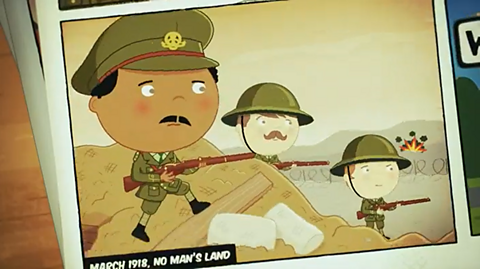What were trenches?
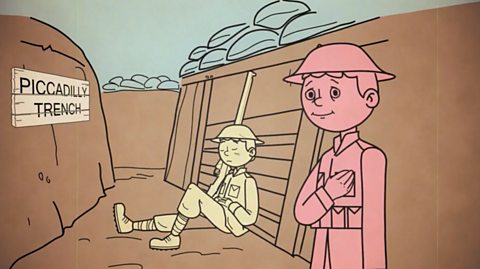
On the Western Front, soldiers on both sides lived in trenches.
Trenches were long, narrow ditches dug into the ground.
They were very muddy.
Some soldiers developed a problem called trench foot.
In the middle was no man's land. Soldiers crossed this to attack the other side.

What were the trenches like?
Watch our video to learn more about life in the trenches.
[SNARE DRUMS]
JACK: I donÔÇÖt mind the rainy weather.
I quite like playing in the mud.
But IÔÇÖd probably feel different if I was a soldier in the trenches during World War One.
WW1 SOLDIER JACK: Mud? Oh, we know all about mud here on the Western Front.
WeÔÇÖre living in it.
WeÔÇÖve dug hundreds and hundreds of miles of these trenches.
TheyÔÇÖre full of water in the winter.
Full of flies in the summer.
And full of rats all year round.
But theyÔÇÖre very important.
These trenches are the only thing stopping the enemy advance and, when weÔÇÖre posted here, they become our home.
ItÔÇÖs like an entire town here.
We have operations dugouts to plan attacks.
WeÔÇÖve built observation points to spy on enemy movements.
And if youÔÇÖre injured you can treated at the medical post.
We get lunch from a cooking shelter.
ItÔÇÖs supposed to be meat and vegetable stew but my mate reckons we should fill the sandbags with it.
After repairing and cleaning the trenches in the afternoon we get the chance to grab some sleep or to read letters from home.
Reading them makes me feel happy and sad all at once.
But we canÔÇÖt rest for long.
Soon itÔÇÖs back to the firing trench because most attacks start at the end of the day, and we must be ready and alert.
I can see the enemy from here.
Imagine the length of a football pitch ÔÇô thatÔÇÖs how close they are sometimes.
We watch each other as the sun goes down and all through the night.
And we think of home, our real home.
JACK: I can get out of the mid and the rain any time I want, but those soldiers couldnÔÇÖt.
And lots of them never did get the chance to go home.
What happened in an average day?
| Time | Activity |
|---|---|
| 5am | 'Stand-to' (short for 'Stand-to-Arms', meaning to be prepared for enemy attack) half an hour before daylight |
| 5.30am | Rum ration |
| 6am | Stand-down half an hour after daylight |
| 7am | Breakfast (usually bacon and tea) |
| 8am onwards | Clean selves and weapons, tidy trench |
| Noon | Dinner |
| After dinner | Sleep and downtime |
| 5pm | Tea |
| 6pm | Stand-to half an hour before dusk |
| 6.30pm | Stand-down half an hour after dusk |
| 6.30pm onwards | Work all night with some time for rest (patrols, digging trenches, putting up barbed wire, getting stores) |
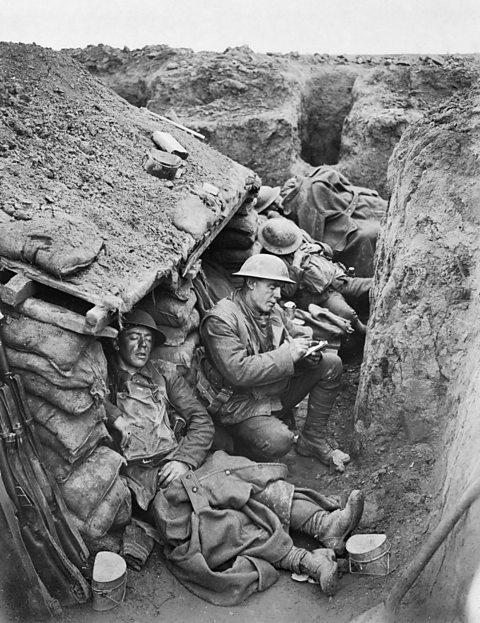
Soldiers only got to sleep in the afternoon during daylight and at night for an hour at a time. During rest time they wrote letters and played card games.
What did the soldiers have with them?
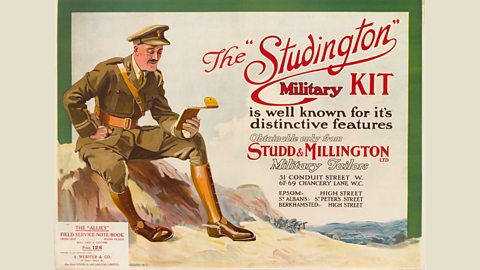
Image caption, Soldiers carried lots of equipment
This included a gas mask; weapons and ammunition; protective clothes like boots and a helmet; ÔÇśwebbing equipmentÔÇÖ which contained personal items like shaving kits and water bottles; and a shovel.
Image caption, Families sent parcels of food to their relatives at war
They sent items such as chocolate, tobacco and tinned food. By 1917 the ration for an average British soldier was just 6 ounces of 'bully beef' (called corned beef today).
Image caption, Many soldiers ate 'Maconchie's meat stew' and hard biscuits
Sadly the meat was mostly fat. This and a shortage of fresh fruit and vegetables was responsible for many soldiers to suffer from upset stomachs!
Image caption, 91╚╚▒Čsickness was a big problem
Soldiers were allowed to write letters home and were given free postcards or headed paper. But most letters were read by an officer who checked they did not give away secrets or spoil morale.
1 of 4
Christmas presents and a football match
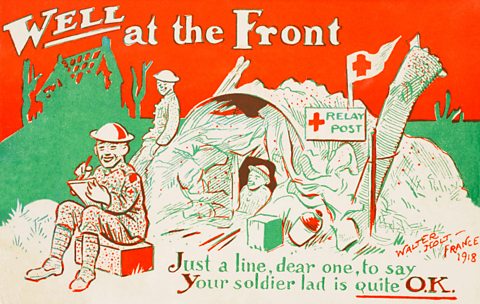
During the first Christmas of the war, soldiers from both sides stopped fighting and met in no man's land. They sang carols together and gave each other food as presents.
On Christmas Day, a British soldier kicked a football out of his trench and the Germans joined in. It was said that Germany won the match 3-2.
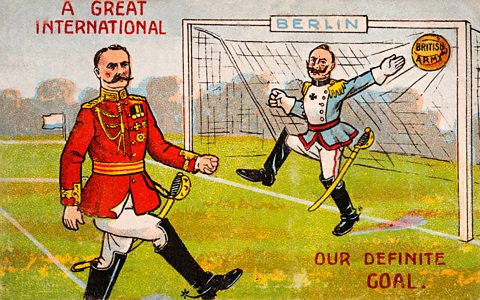
Activities
Activity 1: What things were in a trench?
Explore our interactive trench scene and click on different objects to find out more about them.
There are ten different objects to find. You can use the question mark button to highlight them all.
Activity 2: Quiz ÔÇô Life in a trench
Activity 3: History Explorer game
Play this game to test your knowledge and learn even more facts about World War One.
History Explorer: Secrets through time
History Explorer: Secrets through time: KS2 History
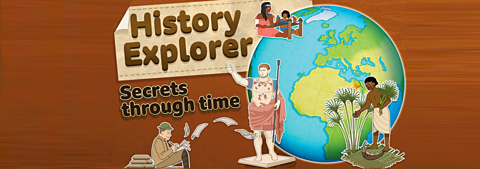
Bitesize Primary games. gameBitesize Primary games
Play fun and educational primary games in science, maths, English, history, geography, art, computing and modern languages.

More on World War One
Find out more by working through a topic
- count26 of 43
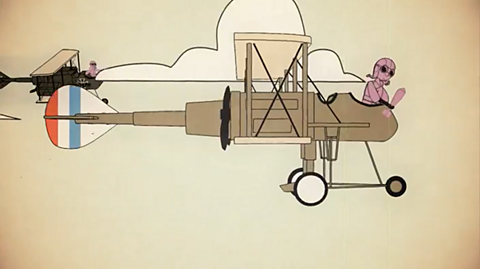
- count27 of 43
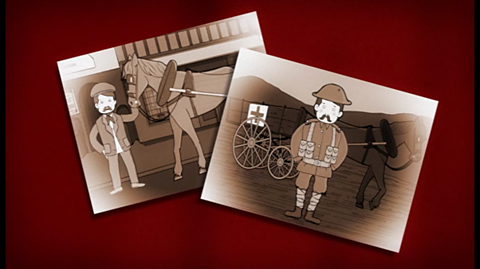
- count28 of 43
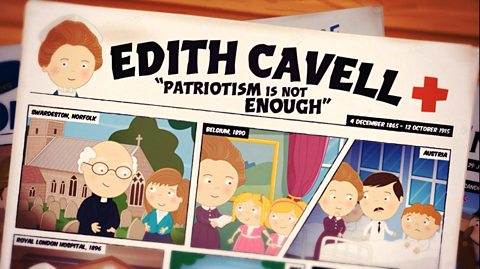
- count29 of 43
